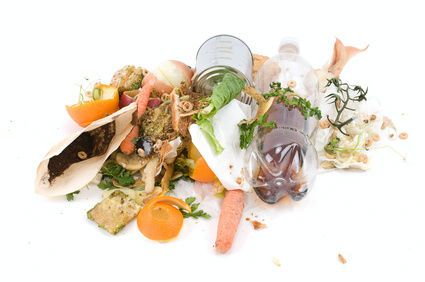
You’ve probably been guilty of it…throwing away a package of this or a box of that because you’re approaching that all-important “sell by” date. According to a report from the National Resources Defense Council, 40 percent of the food produced in the United States gets thrown out each year.
That translates into an overwhelming $165 billion in wasted food. The average family of four throws away between $1,350 to $2,275 worth of food annually. Think of what you could do with that extra dough!
While sometimes you simply forget about that head of lettuce in the fridge or the pound of cheese which seemed like a good idea at the time, often the reasons for laying waste to so much food can be avoided. Follow some of these tips that will both save you money and keep those uneaten meals out of our landfills.
Plan Ahead. Do you know what happens when you grocery shop while hungry or tired? That’s right, you buy way more than you need and more than likely purchase items you’ll never try. Avoid over-purchasing by planning your weekly meals ahead.
Be realistic in your meal planning. If you have a busy week, shop for meals that will be easier to prepare. And be sure to stick to your list when in the store, it will keep you focused and help avoid over-shopping.
Store Correctly. If you know that you won’t be using that entire eggplant in your recipe, research how best to store it. Also, use labels that will remind you when you purchased it or better yet, place a magnetic dry-erase board right on the refrigerator door and list the items that are in there. No one likes to be surprised with a 2 month old head of cabbage in the drawer.
Plan Your Portions. Cooking for one can be difficult. Don’t overestimate what you will eat. Instead, realize that you probably won’t consume an entire pound of cheese on your own (we hope not anyway!) and plan on how you will use your perishable ingredients throughout the week. For families with children, serve the youngsters adequate portions. Children tend to take too much and most of it usually winds up uneaten and wasted.
Learn To Like Leftovers. Some people just can’t eat leftovers. If you fall into that category, learn how to store your uneaten portions for a later date. Freezing certain foods preserves them beautifully for later use, while others can be incorporated into another meal entirely.
 When meal planning, keep in mind leftover ingredients and try to coordinate them into the next-day’s menu. Or better yet, eat that last helping of soup or serving of chicken for lunch the next day. Not only will you be avoiding food waste, but you’ll also have a reason to avoid the fast food counter!
When meal planning, keep in mind leftover ingredients and try to coordinate them into the next-day’s menu. Or better yet, eat that last helping of soup or serving of chicken for lunch the next day. Not only will you be avoiding food waste, but you’ll also have a reason to avoid the fast food counter!
-The Alternative Daily
Sources:
http://www.thedailygreen.com/going-green/community-tips/reduce-food-waste-460708
http://news.blogs.cnn.com/2012/08/22/40-of-u-s-food-wasted-report-sayshttp://www.nrdc.org/food/files/wasted-food-IP.pdf
http://www.thekitchn.com/how-to-avoid-wasting-food-46510
http://www.naturalblaze.com/2013/04/tips-for-understanding-and-avoiding.html

